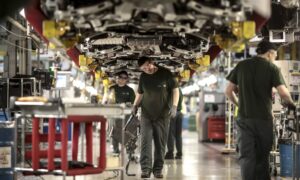
In a year in which all its rivals have reported record profits, Jaguar Land Rover has slumped to losses of £455 million largely due to a shortage of semiconductors.
The loss also includes a write off of £43 million on its closed down operations in Russia because of sanctions over the Ukraine crisis.
A year ago the Coventry-based business, which is owned by India’s Tata Motors, reported profits of £662 million and was talking of profits of £3 billion in five years as it made the transition to Jaguar becoming an electric-only marque.
At today’s full-year results for the 12 months to the end of March, there was no new news on how that journey was going. Asked for an update on its provision of plug-in Jaguars, PB Balaji, chief financial officer at Tata Motors, said: “We are working towards delivering that.”
For its full financial year, total sales were down 14 per cent at 376,000. Sales of Range Rovers and Land Rovers fell 12 per cent to 299,000. Jaguar deliveries fell 20 per cent to another new low of 77,000.
Five years ago the company was reporting total sales of 621,000. Range Rover/Land Rover deliveries stood at 442,000 and Jaguar volumes were 178,000.
Revenue for the past year was down 7 per cent at £18.3 billion, down 7 per cent from the prior year. That is about 25 per cent lower than in its pomp when it was doing more than £24 billion.
In the past year, £1.16 billion of cash left the business. Its latest quarterly sales show that January to March came in lower than in the final three months of 2021, while year-on-year sales were down 36 per cent.
On top of £412 million losses from normal operations, the company booked a £43 million charge for a “pause” in sales to Russia and Ukraine which historically have accounted for 2.5 per cent of annual sales.
Last year its bigger German rivals all blew the doors off. BMW reported the largest profit in its history, €12.5 billion. Mercedes-Benz made €12 billion in the final quarter of last year alone for a total of €23 billion for the year. Volkswagen made profits of €20 billion.
VW’s British subsidiary Bentley, based at Crewe, geographically between Jaguar Land Rover’s two main plants of Solihull and Halewood, recently reported profits for the first quarter of 2022 of €170 million on top of a record €389 million for 2021 after selling 14,600 vehicles, 30 per cent higher than it had done before.
At issue is the semiconductor supply crisis, the microchips which are used in their hundreds in the modern car.
The big manufacturers have had trouble getting supplies but have diverted the shipments they have received into their most expensive and most profitable lines including electric cars. As a much smaller operation, the semiconductor shortages have disproportionately affected Jaguar Land Rover.
The group remained upbeat. It said before exceptional items, it had made just better than break even in the first three months of the year and was cashflow positive.
It said demand for its newly updated core Range Rover product was strong as were orders for the Land Rover Defender, now built in the low-cost economy of Slovakia.
Underpinned by its wealthy parent company it has £4.4 billion of cash and a £2 billion in undrawn bank overdraft arrangements.
However, it warned that the immediate outlook was not good. “Inflation represents an increasing headwind for the business,” the company said in its earnings statement.
It added: “We expect the global semiconductor shortage to continue through the next fiscal year with gradual improvement. Covid lockdowns in China are expected to limit volume improvements in [the April-June] possibly resulting in negative earnings and negative cash flows in the quarter.”
Thierry Bolloré , the French automotive veteran who became Jaguar Land Rover’s chief executive 20 months ago, failed to make a scheduled media briefing but said in a statement: “The environment remains difficult.”
Read more:
Jaguar Land Rover posts £455 million loss as chip shortage bites





